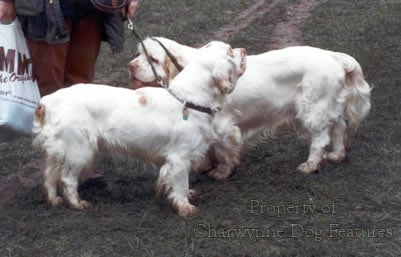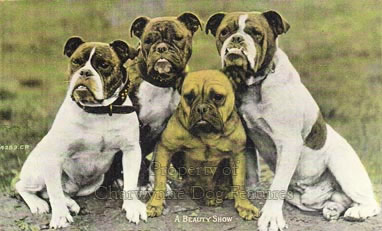65 FOR DOGS' SAKE
FOR DOGS' SAKE
by David Hancock
 "...I believe we should do our best to breed healthy dogs and, by and large I think in this country we do. But that does not stop vets, journalists (and others including Beverly Cuddy) sounding off as if the train is about to go over the cliff." So wrote David Cavill in his foreword to the August 2007 issue of Dogs Monthly. His reference to Beverley Cuddy, editor of Dogs Today, was probably sparked by her impassioned plea for the Kennel Club to introduce mandatory health checks, in both her magazine and a daily broadsheet. My impression was that her concern was over the 'direction of the train', rather than any imminent disaster. That is my stance too. I thought her words in both publications were fair, balanced and brave. Those heavily involved in the show dog world need to be vigilant less they fall victim to what the French term 'deformation professionelle'; vocational imperatives can blur the judgement. Both David and Beverly strive to promote healthier dogs.
"...I believe we should do our best to breed healthy dogs and, by and large I think in this country we do. But that does not stop vets, journalists (and others including Beverly Cuddy) sounding off as if the train is about to go over the cliff." So wrote David Cavill in his foreword to the August 2007 issue of Dogs Monthly. His reference to Beverley Cuddy, editor of Dogs Today, was probably sparked by her impassioned plea for the Kennel Club to introduce mandatory health checks, in both her magazine and a daily broadsheet. My impression was that her concern was over the 'direction of the train', rather than any imminent disaster. That is my stance too. I thought her words in both publications were fair, balanced and brave. Those heavily involved in the show dog world need to be vigilant less they fall victim to what the French term 'deformation professionelle'; vocational imperatives can blur the judgement. Both David and Beverly strive to promote healthier dogs.
Vets, as in every profession, have their self-promoters, those who choose to spread alarm in transparent attempts at attention seeking. But veterinary scientists have a duty to speak up, without being alarmist, when they have legitimate concerns over animal welfare. I have yet to read of any vet in any country pooh-poohing statements of concern over the lack of attempts to obtain effective controls in pedigree dog breeding. Most of the conclusions I have read resulting from veterinary studies have been slightly understated not headline seeking. Do we truly not want vets to speak up when they have worries about failures to acknowledge the threat to dogs from inheritable defects? What is the veterinary profession actually saying?
In 1988, four Canadian vets at the Ontario Vet College produced for me the most impressive, convincingly-argued and constructive report on this subject yet published. Its conclusions were alarming but not alarmist - and there is a difference. Here are some of its findings: "The next hundred years look rather bleak for the purebred dog industry unless dramatic changes are introduced...It is estimated that over 60% of purebred dogs have some inherited physical defect...Canine surgeons, at referral hospitals spend over 70% of their time trying to correct genetic defects...we cannot blame only the breeders, judges and veterinarians for the problems in the purebred dog industry...Even the humane societies and animal welfare groups have not been doing all they can to stop the breeding of unsound animals."
In 1990, the respected reputable American magazine The Atlantic Monthly published a report into 'how greed and AKC policies are endangering the health and quality of American dogs'. It was angrily dismissed by US dog breeders but its findings were never faulted. And the AKC took action on the points made. One of its conclusions was that "The AKC not only has been slow in investigating genetic disorders but also has not taken steps to encourage their elimination. This failure is inexplicable, given that dog shows are supposed to present breeding stock." Another hard-hitting statement read: "For many faddists, the dog has become little more than equipment for a game. They justify the game in the name of freedom, arguing that no organisation or government body has the right even to recommend changes in their approach, despite its destructiveness, and the AKC has endorsed their ideology through word and policy." Doesn't our own KC argue a similar plea to be left alone to run the dog game their way?
In 1981, in the authoritative magazine New Scientist, vet Simon Wolfensohn produced a well-reasoned article entitled What Man Has Done To Dogs, with these conclusions: "...there are basically two types of problems afflicting pedigree dogs. One concerns the physical problems that result directly from overzealous interpretation of poorly defined breed standards, without sufficient regard for the comfort of the animal...The other involves the more subtle problems of conditions affecting various body systems, established, mainly by accident, in certain breeds or lines. These are essentially the fault of the pedigree system of breeding that is obsessed with appearances and pays insufficient attention to considerations of general health. In both cases the root cause is human greed..." What an outcry there would have been if Beverley Cuddy had penned those words!
Twenty years ago, leading geneticist and dog fancier Dr Malcolm Willis wrote in the KC's own Kennel Gazette: "In some breeds, admitting to the occurrence of an inherited defect is hazardous. Many breeders will openly condemn those who confess to having had a problem. It is as if breeders believe that silence will make the defect go away...It is far more mature to admit to problems and collectively try to solve them. In the short term there may be heartache and economic loss for some, but in the long term the breed will benefit." If that had been written by a journalist in Dogs Today no doubt a responding complaining letter from the ever vocal KC secretary would have ensued. Airing a problem is better for dogs than suppressing it. The KC argument that mandatory health checks will ruin a gene pool doesn't seem to be supported by evidence from mainland European countries where they are in place.
Vet, KC trustee and committee chairman, the late Mike Stockman, has produced words on health issues over the years. "It could be said that some of the expertise and ability now available in the canine operating theatre has made it too easy for breeders of those shapes of dog whose physical construction leads to a high percentage of whelping risks. They continue to produce, by Caesarien section, specimens which would be better if they had been bred with less exaggeration of head size and a more appropriate pelvic circumference." (The Field, 1981). "It is the avoidance of excesses which is most important and the stress laid on minor points such as ear-length at the expense of fundamentals such as soundness of movement or temperament serves only to produce dogs which are far removed from the type envisaged by those who composed the original standard." (In Practice, 1982). These were key points in the articles written at Crufts time in 2007, which provoked such a strong adverse reaction from the KC secretary, his daughter! So, a KC mogul can speak up but the editor of Dogs Today can't!
A decade ago, the chief scrutineer of the BVA/KC HD scheme, Gary Clayton Jones, stated that in order to make progress with this and other hereditary diseases, breeders and exhibitors must be stimulated by 'people who control dogdom' to follow the path which he and others advocated ten years ago and this was that every dog and bitch should be eye and hip tested before they can enter the show ring. Now if a journalist had written this, what an outcry there would have been from the cosier elements of the dog press. No wonder the 'faddists', as The Atlantic Monthly called them, have been able to maintain the highly unsatisfactory status quo over health checks for so long. But vets can be accused of 'fence-sitting' on this subject too; the reporting of incidences of hereditary defects from vets' surgeries is still unsatisfactory.
Claims of client confidentiality are misplaced; medical confidentiality is between the patient and the surgeon; a vet's patient is the dog. I would just love to hear a vet say to me over an inherited defect in one of my dogs: 'I believe there would be benefit in recording this incidence for research purposes, can I have your agreement for this to be done?' Who is more important the sick dog or the breeder/owner? Breeders signing up to the KC's code of ethics have, since 1991, to allow their vet 'operating in any way to alter the natural conformation of the dog to report such an operation to the KC'. Writing about this in the RCVS News in 1991, Mike Stockman observed "If veterinary surgeons do not avail themselves of this situation, they will only have themselves to blame if dogs continue to appear in their surgeries which are physically unable to see, breathe, exercise and procreate naturally." Well done, him. But would it not be better if every vet-identified inherited defect had to be reported to the KC for papers to be marked. How serious are we about canine health?
Is it surprising that writers get all 'het-up' when there is a woeful lack of joined-up canine care? Is drawing attention to this state of affairs really scare-mongering? A far better example of scare-mongering is the absurd rumour-spreading that European legislation to curb exaggerations in dogs (ETS 125) will destroy some of our native breeds. The truth is it may well restore them to their rightful traditional physically-sounder form and that is surely better for the dogs. One day soon, the FCI will recognise a breed called the Continental Bulldog. It will be like our unexaggerated Bulldog of the early 19th century and this will embarrass us all. Time and time again when changes are proposed in dogdom it is breeder-interest which is defended not dog's well-being. That is simply scandalous and shame on any magazine which pursues such a line.
The woeful quite disgraceful breed club response to the Health Survey commendably initiated by the KC in recent years indicates where 'the train is going off the rails' if not over the cliff. With such a pathetic response to a request for vital information on their breeds, a more accurate metaphor would be that the pedigree dog game train is hitting the buffers and being forced to stop. The buffers are the negative hyper-defensive reactionaries in breed clubs who oppose any innovation because it disrupts their cosy world. 'Don't worry about the dogs just let me pursue my hobby my way', seems to be the prevailing attitude. For nearly 20 breeds to have a less than 15% return on a health survey intended to benefit their breed is simply disgraceful. Scientists need data if they are to contribute to animal welfare.
What actually is the state of aortic and sub-aortic stenosis in Boxers, GSPs, Pointers, Rottweilers and Newfoundlands? What truly is the incidence rate of PDA in Border Collies, GSDs, Pomeranians and Maltese, DCM in Dobermanns, Great Danes, St Bernards and Irish Wolfhounds and MVD in Cavaliers, Cairn Terriers and Boston Terriers? What really is the threat of idiopathic epilepsy in Mastiffs, Poodles, Schnauzers and Tervuerens? How liable is your Flatcoat to glaucoma, your English Toy Terrier to juvenile DCM, your Aussie Shepherd to cataracts, your Dobermann to Von Willebrand's, your Tibetan Terrier to lens luxation or your Beardie to Addison's? There are more than 50 different health concerns in the Dachshund. If 90% of Cavaliers have a heart murmur by the age of 10 and 80% carry syringomyelia, is their train not going over the cliff?
In 2005, 248 litters of Akita were registered but only 58 Akitas were eye-tested. This is reckless breeding. Twenty years ago, only 30 Bloodhounds had been hip-scored; the mean score in Clumbers is 40. In the United States, responsible Alaskan Malamute breeders reduced incidents of dwarfism in their breed to zero. The Portuguese Water Dog breeders reduced the water storage problem in their breed quite dramatically. Responsible breeders, working with scientists can make a significant difference to the future of their breed. But they have to 'hit the buffers', those harmful conservatives in a breed who see any innovation as a threat; how can science benefit dogs if we do not feed it with information? Why is journalist-lobbying in a good cause so viciously opposed in the dog press?
I have been going to dog shows for sixty years, man and boy. I have seen outstanding dogs, met gifted breeders and am all in favour of pedigree dog breeding – when it’s working. I am in favour of pedigree dog conformation shows when they are seriously conducted to identify future breeding stock: proper livestock shows. However I am acutely aware of ‘deformation professionelle’, skewed thinking or hobby-blindness, affecting devotees of the dog game.
We can all become too close to our pursuits to accept a need for progress. There are times when each of us, in every field, need to sit back and challenge the status quo, the received wisdom. That was how ancient beliefs were qualified, baseless superstitions dismissed and harmful prejudices defeated in so many human activities. Knee-jerk opposition to change contributes little to dog care. The key question must always be: what is best for dogs? Not, what is best for dog breeders.
Gentle persuasion is no bad first step in attempting change. But when dogs are recklessly bred, with little thought for their long-term health, there are clearly forces at work for whom gentle persuasion translates as weak governance. That is the dilemma facing those with responsibilities in dogdom. Change for change’s sake is never wise; progress for dogs’ sake has to be the goal.